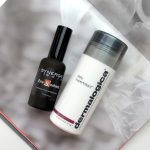You buy all the products, you put them on your face… and then your skin gets worse?
Rude.
Today we’re busting five skincare myths that are ruining your skin – and I swear I’m not just going to talk about wearing sunscreen every day.
Video is here on YouTube, keep scrolling for the text version…
Myth 1: High concentrations are better
It makes sense that we feel this way. If 5% of something is good, then 10% must be twice as good. But there’s diminishing returns when it comes to skincare.
It’s like eating burgers. One burger is good, two burgers is maybe better… but then ten burgers? You start to feel like trash.
Or cake ingredients. One teaspoon of vanilla extract is nice, two is better. The whole bottle is maybe a bit much, and if the whole cake is made of vanilla extract, it’s definitely not a good cake.
It’s the same with actives in skincare – it’s about hitting that sweet spot in the middle.
If you don’t have enough of something, it has no effect. If you have too much of something, then it’s too much – you’re in side effect territory. For skincare, side effect territory is usually irritation, or stripping your skin barrier.
You know you’ve done this if your normal products start to sting when they get on your face – water might even sting. Your skin might go red and feel tight, and get weirdly shiny. You might also get bumpy, textured skin, which is usually the opposite of what you’re going for.
Irritating your skin also leads to inflammation, which is also not good. There’s the term “inflammaging”, which some brands have been trying to make catch on for a while now. It hasn’t really caught on much in skincare, but the gist is that inflammation can speed up some of those changes that happen in your skin over time (premature aging), which isn’t good.
Inflammation is also one of the four factors that contributes to acne.
Related video: My Top 5 Acne Tips
So stick with a concentration that makes your skin happy! Don’t try to go higher just for the sake of going higher. And if people tell you to start on a low percentage, start at a low percentage! Don’t try to cut corners. The corner is a lie.
Myth 2: You should exfoliate flaky skin
This also seems like makes sense. Your flaky skin wants to come off, so you help it off with exfoliants.
But sometimes the reason your skin is flaking off is that your skin’s natural shedding processes are messed up. Adding exfoliants will probably mess it up more! If your flaky skin is red or irritated, then adding an irritating exfoliant into the mix is not going to help.
Related download: FREE Exfoliation Guide!
So if that’s your situation, leave it alone and let it chill. Maybe slather on a nice soothing cream, like La Roche-Posay Cicaplast Baume B5 or even just Vaseline. Lack of hydration can also sometimes mess up your skin’s desquamation process (natural exfoliation), so something bland and hydrating can help.
OK, sometimes you do need to get rid of dead skin flakes really quickly, like if you’re about to put on foundation. In that case, you can exfoliate it off super gently with a damp towel or a gentle peeling gel. You want to just to break off the dead skin at the surface.
But apart from that, leave it alone!
Myth 3: You need to use every active ingredient every day
This happens to people a lot. You have a day routine and a night routine, but you want to use 10 products. So you use 3 in the morning and 7 at night.
Now, some people enjoy having a nice long routine… but you probably don’t need one, and sometimes it is actually too much.
Quite a lot of actives are fine being used less regularly than once a day, and can be used once or twice a week instead.
For example, there are studies on tretinoin (a form of vitamin A) where they were used once every three days.
Related post: Busting Retinoid Skincare Myths (with Video)
Vitamin C is believed to have a depot effect – in other words, it stays active in your skin for more than 24 hours.
Related post: Ultimate Vitamin C Skincare Guide Part 1: Ascorbic Acid (with video)
There’s also exfoliation. It’s usually recommended that you only exfoliate once, or maybe twice a week.
So you don’t need to use every product every single day! The best approach is to learn to listen to your skin and give it the products it needs. Most importantly, you need to not mess it up more when it’s already a bit messed up.
I talk more about getting to know your skin in my eBook The Lab Muffin Guide to Basic Skincare. Basically, you want to keep track of what you’re putting on your skin, and how your skin responds. Keeping a skincare diary is a good way, as is taking photos. You should also change one thing at a time so you can see how your skin actually responds.
And remember, if you use too much of anything, you can end up with skin irritation, mess up your skin barrier and get that textured, uncomfortable feeling along with stinging. And inflammation can also lead to accelerated aging and acne.
I personally use a three night cycle. On night one I’ll use a retinoid, night two will involve chemical exfoliation, then night 3 is the rest night where I use gentler things like niacinamide and vitamin C. (For me, vitamin C is quite gentle but for some people it’s not – so again, listening to your skin is super important!)
Related post: 2019 vs 2020 Skincare Routine: Approach and Products (Video)
Myth 4: Cleanser doesn’t matter
It’s tempting to assume that your cleanser won’t make a big difference, since you’re washing it off your skin so quickly. But sorting out my cleanser and cleansing routine was one of the things that made the biggest changes to my skin!
There’s actually quite a lot of scientific research on cleansers – like how to make them more gentle, and how to make them not contribute to acne. But there’s still a lot of cleansers on the market that don’t follow the rules.
For example, the best practices for formulating cleansers include making them at a low pH, and adding some hydrating ingredients to stop them from stripping your skin.
So before you buy a cleanser, make sure you look up reviews from people with similar skin to you.
Related post: Are You Washing Your Face Wrong? Busting Cleanser Myths (with video)
I have oily skin, so when I was younger I used a pretty harsh cleanser. I used it twice a day, and unsurprisingly, it dried out my skin. This seemed to be a good thing, but it often felt like my skin was really tight and hard, and the oil just sat on top (a classic oily-but-dehydrated skin symptom). After I cleansed in the morning and applied makeup, the oil came back really fast and my foundation would wear off quickly.
Once I got better at skincare, I switched to a gentle cleanser once a day and my skin has been so much happier since. Makeup lasts for much longer, and my skin doesn’t flood back with oil as quickly.
Related post: Is Your Skin Dry or Dehydrated? And How to Treat It
Also if you’re wearing a mask a lot, you might end up with mask-induced skin issues that a different cleansing routine can improve.
Wearing a mask means you’re trapping moisture against your skin, and that extra moisture changes the microbes on your skin. It also makes your barrier a bit more permeable. There’s also extra friction, and overall this can lead to a lot of irritation and inflammation.
Taking off your mask when it’s safe and cleansing underneath is a really good idea. If you’re out, you can use wipes or micellar water.
Also check for how you’re cleansing as well – things like your water temperature and what cleansing tools you’re using can also make a big difference.
Myth 5: Sunscreens are all awful
I kind of lied – I did need to talk about sunscreen!
I see a lot of people trying to make the wrong sunscreen work. I don’t mean in terms of chemical vs physical sunscreen, or what SPF to use, but rather, just what works for your skin.
And so many sunscreens are just annoying! They might roll off your skin, or they might break you out. They might just feel really terrible.
I blame men. There are a lot of men in the skincare industry who don’t use skincare and wash their faces with shampoo – and they’re making decisions about what skincare products get launched, resulting in lots of products that don’t make sense to the people using them. And this crappy sunscreen situation means a lot of us aren’t using enough sunscreen – or even worse, we might just skip sunscreen altogether.
But there are more women and men who use skincare getting into decision-making roles, as well as just people who are considerate and listen to what their customers actually want, even if they aren’t part of the target market themselves. So there are a lot of better sunscreens hitting the market – don’t feel like you just have to put up with bad sunscreens!
These days, not all sunscreens are awful, and a lot of them feel really nice on your skin (I talk about my latest favourites here).
Related post: My Favourite Sunscreens: 2021 Update (with video)
Also, a lot of fear-mongering about sunscreen ingredients and rules for what sunscreen you’re meant to use aren’t really legitimate!
Related post: Sunscreens in your blood??! That FDA study
It’s more about finding a sunscreen that you enjoy, so you’re happy to wear it every day, with a decent application amount (about a quarter teaspoon for your face).
What’s the worst myth you believed?
This post contains affiliate links – if you decide to click through and support Lab Muffin financially (at no extra cost to you), thank you! For more information, see Disclosure Policy.






Loved the piece. Always good advice. One thing that might help your readers is mentioning that the mask trapping moisture is a medical mask, rather than a treatment mask. I was confused for a couple of paragraphs until I remembered the global pandemic.
Same as you, I used harsh cleansers and suffered through greasy skin all day. I also did not understand hydration and thought that because I had oily, acne prone skin, I should not use moisturizer. So even when my skin was clear, it never looked really nice.
Great post, super informative. Loved everything except the ‘I blame men’ bit. That sounds overly simplistic and also a bit sexist to me. Are you sure men are the only reason? If so, why?
It’s a joke, but in general the overrepresentation of people who don’t use skincare in the process of making skincare products means there are things they don’t consider when making products. For example, there are many “everyday sunscreens” that are advertised as “weightless” that pill up under most makeup products. On the other hand, when you have user-led product development like for Ultra Violette sunscreens, you end up with products that stay smooth under most foundations, and actually live up to “suitable for everyday wear” claims. Same with “for all skin tones” sunscreens that are whitening on all but the palest skin – these products just wouldn’t exist if darker-skinned people were involved in the decision-making process, or at least considered. The inability of the product to live up to that claim would be obvious.
That might be something to bring up in another blog post? I can see men as over represented as board members in cosmetics companies however cannot find much in the way of who actually makes the decisions, who formulates the products, who orders product formulation, who conducts customer/user trials, etc.
Just based on intuition, not statistics, I’d expect however a higher proportion of women / POCs / women POCs / gender non conforming / non cis hetero people in the cosmetics industry compared to other fields. Of course, I could be completely wrong – pure conjection on my part.
Simply blaming men (without clarifying that it’s a joke) and without having the data to back up your opinion is not cool, even if you think it brings you woke points. From my end, I’m not awarding you any.
I would have expected a more nuanced approach and better critical thinking skills from a STEM field PhD. If I can’t change your mind, that’s ok too. Agree to disagree, maybe.
It’s a very widely recognised issue in cosmetic chemistry, and it’s apparent anytime you step into a cosmetic conference. See e.g. these articles:
https://www.happi.com/contents/view_online-exclusives/2019-08-02/this-womans-work/
https://chemistscorner.com/why-arent-there-more-women-in-cosmetic-science/
It’s surprising you acknowledge it’s pure conjecture on your part, but then go onto saying that I’m lacking in data and critical thinking skills, when as a qualified cosmetic chemist and someone who’s been involved in this field for a while before that, I’d have far more information than you about who my peers are. I’ve had zero pushback and only agreement on this point from people who work in cosmetics, from all demographics.
I am absolutely convinced that you have more insight and are a lot smarter than me – which is why I feel that either explaining that you were joking, or citing sources, would benefit your post.
As you have more insight and better access to sources, I think an article about this topic would be super interesting for lots of people. Something with actual numbers to back you up. As in, how many business are run / owned by women, how do women do business differently / more successfully, etc.
I cannot say for sure whether blaming crappy cosmetics on men might not be too simple of a hypothesis (many things in life are not all that simple, black and white – I’m sure you’ll agree) but I am keeping an open mind and I am completely ok with changing my mind. Like I said, I don’t know much, and certainly not as much as you, which is why I said it was pure conjecture on my part.
But, to quote your Happi article:
I think it is indicative of what is going on in industry itself. A lot more women are part of this industry,” noted O’Grady, “There is more STEM involvement; more women in chemistry. We have seen uptick in women involved in and joining the organization.”
Currently, the 12-member SCC executive board is dominated by women. Just a few years ago, it was a 60/40 split male to female. Today, there are just two men on board.
And women represent the vast majority of SCC’s student membership, too, according to O’Grady
To quote what I wrote above: “But there are more women and men who use skincare getting into decision-making roles, as well as just people who are considerate and listen to what their customers actually want, even if they aren’t part of the target market themselves. So there are a lot of better sunscreens hitting the market – don’t feel like you just have to put up with bad sunscreens!”
As you quoted from the Happi article, “Just a few years ago, it was a 60/40 split male to female.” Sunscreens generally have a multi-year timeline. The development of many sunscreens on the market would’ve started 10+ years ago.
90% of beauty users are female, while less than 50% of cosmetic chemists are female. I’m not sure why you find it so controversial that people who use a product would probably be able to make that product better than people who don’t use that product. And if you scale that probability to the thousands of products on the market, it’s unsurprising that so many products aren’t very user-friendly in practice. I’d expect better critical thinking skills from someone criticising my critical thinking skills.
I used to believe in the “harsh cleansers are great for acneic skin” – to be fair, it was what my dermatologist told me back then (30 years ago).
Switching cleansers made a huge difference indeed.
And I blame men too – I know you had a lot of backlash for that, but I completely get where you are coming from.
I laughed because you talked about me in here (“Hmmm; if 5% is good, then 25% must be five times better! Hey! Why is my face red and peeling?”)
I took up cosmetic chemistry because I became irritated about products being out of my price range but when I look up the cost of the actives, even I (someone on disability living in poverty) could afford them. But the percentages *sound* so stingy, so I use a lot more. 😀
One thing I’d like to mention that might help younger readers feel better: when I was younger, I fought with pimples, clogged pores, oil, and so on, but now that I’m 60, I have beautiful skin. So much so that I find myself marveling at it in the mirror. While sometimes it makes me a little wistful (why couldn’t I have had this gorgeous skin when I was younger and needed it for dating?), I mostly just appreciate it. Maybe knowing this, people can have something to look forward to, and can stop cursing their skin so much.
(Most people I know who are my age feel the same way.)
It may help to know that you won’t *alsays* be fighting your skin (especially the oily part; sebum production seems to slow waaay down as we age.)
Hi Michelle, firstly congrats on your collab with cetaphil, feel very happy for you.
Can you please tell me about the uva coverage of neo heliopan ap? Some sources tells it has uva 2 coverage and not uva 1. I use a sunscreen that has neo heliopan ap as a sole uva filter with the bunch of UVB filters. It is labelled spf 50 and pa++++. Do you think that the formulation is not effective for uva 1 wavelength protection?
I love when you dispel the fear mongering around specific ingredients. One ingredient I’ve seen a bit of push back on lately is hyaluronic acid. It’s been so popular, but lately I’ve seen warnings about it drying out the skin further by drawing moisture from within your skin if your environment isn’t humid enough. I live in a relatively dry climate and have been experiencing some dryness, so I thought I’d avoid HA and see if that helped. However, after reading up I’m under the impression all humectants do the same thing? So wouldn’t glycerin, honey etc also be at risk of drying your skin out? Should we avoid humectants in drier environments? Or is it more do to with concentration? For example is the risk mitigated by the fact that most formulas contain water? I avoid very occlusive products as I’m also breakout prone. Do I just need to find a better occlusive layer to prevent the moisture evaporating? I’m now confused and paranoid that “hydrating” products could actually make my skin worse. Is there a reason HA has been singled out? Basically I’m just asking if you could please consider doing a post about humectants & lower humidity environments and how that all works. I’m looking forward to your post on vitamin c derivatives!
Not skincare related but I’m loving the new layout of the website!
Thank you! 🙂
Loving your new website layout, loving this post! Every time I’m wondering if I need to change things up, but unsure where I should start, I always see a new post by you answering my crazy questions. So thank you for that! I don’t know why cleansing once a day is the only thing I’m still hesitant about it (currently blaming it on old habits die hard lol); but everything else here is helping me out so much.
Thanks Michelle!
Really enjoyed this post and video and I was definitely guilty of myth 3 in the past. For years I tried to push my skin to tolerate retinoids every single night, and while I could get it to not respond with dermatitis or flaking with a bit of regimen tweaking, I always had persistent redness and dryness. Moreover, I was just using retinoids for preventative antiaging and didn’t have acne or much in the way of photoaging, so in some ways, I was simply just creating new problems and not addressing anything.
Using retinoids every third night really helped bring down the redness and dryness, and then I just use different actives on the off-nights: usually glycolic and ascorbic acid on night 2 and then niacinamide and peptides on night 3. Interestingly, despite being considered “actives”, glycolic and ascorbic acid don’t contribute to my skin dryness…they can cause stinging upon application if I choose to strong of a product, but they don’t cause dermatitis or redness like retinoids, so using these moderately in a regimen alternated with tret seems to give me an overall better effect with fewer side effects.